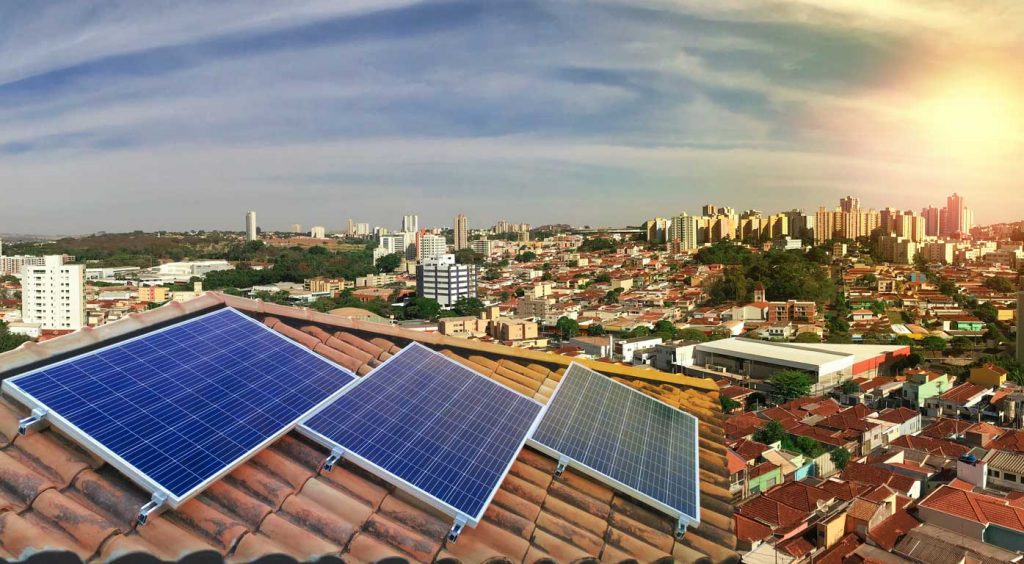Portugal’s first renewable energy community (REC) was inaugurated in August 2021 in Miranda do Douro, a northern small rural village close to the border with Spain. The project was implemented by Cleanwatts, a climate tech company offering clean energy services based in Coimbra, Portugal. The REC is part of Cleanwatt’s “100 Aldeias” project, which aims to fight energy poverty in the sparsely populated interior of Portugal.
At present, the consumers of the REC are buildings of Santa Casa da Misericórdia, a well-known charitable institution in Portugal, housing nursing homes, and a kindergarten, with more than 100 members in total. After the community’s one year anniversary, Cleanwatts is “now entering in the phase of attracting new members,” Michael Pinto, the company’s CEO, told pv magazine. “Our goal is to expand the work done with the anchor client to as many people in the community as possible.”
The PV panels installed in the community have a production capacity of 73.3 kW and provide electricity for air conditioning, computers, and other energy needs of the institution.
“The benefits in the first year of operation (August 2021 to August 2022) were undeniable,” Pinto said. “Based on the indexed electricity tariff for 2022, which is estimated at €0.35/kWh, Santa Casa da Misericórdia Miranda do Douro would have spent an additional €31,500 on grid electricity,” he added. The REC had an energy autonomy of 33% (90 MWh/year) and saved 19 tons of carbon dioxide emissions.
Analyzing production, consumption
Portugal’s first REC uses eRedes, the distributor unit of national utility EDP, to analyze the production and consumption profiles of the community members, so it can distribute the energy produced accordingly. It also uses Cleanwatt’s energy markets platform Kiplo to aggregate small and medium energy loads, “including batteries, EV chargers, heaters, boilers, chillers and distributed generation systems,” according to the company. The platform works through the company’s virtual power plant, to support community managers and energy market operators.
As for data protection, Cleanwatts separates personal and consumption data and stores them in difference places. That way, “we can work the consumption data, statistically and analytically, safeguarding the personal data of each member,” said Pinto. “Data are stored in a database where each member has their repository properly coded to ensure data protection and privacy.”
The community does not currently use blockchain technology, but Cleanwatts said it has tested the technology in several of its other projects.
“We do intend to make energy transactions between community members possible, in a peer-to-peer logic so that they can exchange among themselves, foster the local economy, and strengthen the community spirit,” Pinto said. “And we want these transactions to be transparent, agile and secure, so we’ll use the necessary technology to ensure the best features for the community members.”
Next step
The goal of the “100 Aldeias” project was to create 100 RECs in Portugal by the end of 2022. By August, there were already 100 and Cleanwatts believes it will reach 200 villages by the end of the year. In total, the communities have over 17.5 MW of production capacity, and more than 1,500 members.
After the success of the REC projects in Portugal, Cleanwatts is expanding into other countries. In June, the company opened a second branch in Italy, where it is co-developing several RECs with partners in northern Italy, whilst assisting other partners to launch and manage their own communities through licensing agreements for the company’s operating system platform, Cleanwatts OS.
“Speed and scale of a member state’s transposal of the EU Renewable Energy Directive into national law is a critical driver for determining whether a market is strategic for Cleanwatts. Beyond Portugal and Italy, countries that we are now assessing include Spain and Austria precisely for this reason,” said Pinto.
In the United States, the company is involved in several community projects in New York and California. It is supporting the development of a small grid solution to enable the city of Ithaca, New York, to achieve its net zero goal. Cleanwatts also signed a partnership with the Indianapolis-based industrial Internet of Things (IoT) company, Blue Pillar, to activate community level demand response throughout the country.
In Japan, Cleanwatts is delivering behind the meter efficiency services to mid-market companies and blue-chip companies, through a partnership with Macnica, a distributor of semiconductors and other hardware and software products.
As for Portugal, the company is on track to deliver almost 20 MW in aggregated solar PV capacity by the end of 2022, and believes it is “in a strong position to triple this volume by rear end 2023,” Pinto concluded.
This content is protected by copyright and may not be reused. If you want to cooperate with us and would like to reuse some of our content, please contact: editors@pv-magazine.com.



4 comments
By submitting this form you agree to pv magazine using your data for the purposes of publishing your comment.
Your personal data will only be disclosed or otherwise transmitted to third parties for the purposes of spam filtering or if this is necessary for technical maintenance of the website. Any other transfer to third parties will not take place unless this is justified on the basis of applicable data protection regulations or if pv magazine is legally obliged to do so.
You may revoke this consent at any time with effect for the future, in which case your personal data will be deleted immediately. Otherwise, your data will be deleted if pv magazine has processed your request or the purpose of data storage is fulfilled.
Further information on data privacy can be found in our Data Protection Policy.